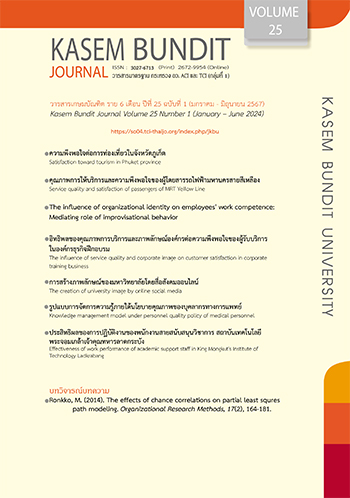The influence of organizational identity on employees' work competence: Mediating role of improvisational behavior
Keywords:
Organizational identity, improvisational behavior, employees’ work competenceAbstract
PURPOSES: To explore the direct influence of organizational identity on employees' work competence and the mediating role of improvisational behavior among employees in the Chinese art education industry. METHODS: This study used qualitative research methods to interview eight leaders in the Chinese art education industry. RESULTS: Organizational identity had a positive influence on employees' work competence, and it had an indirect influence on it through improvisational behavior. THEORY/POLICY IMPLICATIONS: The leaders in the art education industry should provide training and development opportunities for employees, create a positive cultural climate to strengthen employees’ organizational identity, and improve work competence.
References
Albert, A., & Dutton, J. E. (2000). Organizational identity and identification: Charting new waters and building new bridges. The Academy of Management Review, 25(1), 13-17.
Angmalisang, P. A. (2011). The effect of teacher personality on teaching performance. Elektormatika 11(1), 28-32.
Baer, M. (2012). Putting creativity to work: The implementation of creative ideas in organizations. Academy of Management Journal, 55(5), 1102-1119.
Cable, D. M., & DeRue, D. S. (2002). The convergent and discriminant validity of subjective fit perceptions. Journal of Applied Psychology, 87(5), 875.
Fredrickson, B. L. (2001). The role of positive emotions in positive psychology: The broaden-and-build theory of positive emotions. American Psychologist, 56(3), 218.
Gamache, S. (1998). The process of improvisation. Organization Science. 9(5), 560-561.
Haidong, Z. L. (2011). Organizational improvisation: A field that needs further research. The Management Journal (Academic Edition), 3(12), 45-58.
Haixia, W. (2020). Research on teachers' core literacy educational competency curriculum. Teaching Methods, 40(2), 132-138.
Hakim, A. (2015). Contribution of competence, teacher pedagogical, personality, and professional competence on the performance of learning. The International Journal of Engineering and Science, 4(2), 1-12.
Haslam, S. (2001). Psychology in organizations: The social identity approach. Sage.
Hmieleski, C. (2008). The contrasting interaction effects of improvisational behavior with entrepreneurial self-efficacy on new venture performance and entrepreneur work satisfaction. Journal of Business Venturing, 23(4), 482-496.
Hmieleski, K. M., Corbett, A. C. & Baron, R. A. (2013). Entrepreneurs improvisational behavior and firm performance: A study of dispositional and environmental moderators. Strategic Entrepreneurship Journal, 7(2), 138-150.
Hu, B. (2014). Linking business models with technological innovation performance through organizational learning. European Management Journal, 32(4), 587-595.
Huang, L. (2019). A study on the mechanism of work security's influence on employees' work engagement - The mediating role of organizational identity and the moderating role of work complexity. Knowledge Economy, (28), 111-115.
Issa, H. E. (2020). The impact of improvisation and financial bootstrapping strategies on business performance. EuroMed Journal of Business, 16(2), 171-194.
Jeffrey, C. (2004). Teaching creatively and teaching for creativity: Distinctions and relationships. Educational Studies, 30(1), 77-87.
Jiankun, C. (2023). Connotation interpretation, value clarification and practice suggestions of improvisation teaching curriculum. Teaching Methods, 43(6), 62-68.
Karanika, M., Pontes, D., & Griffiths, M.D. (2015). Organizational identification, work engagement, and work satisfaction. Journal of Managerial Psychology, 30(8), 1019-1033.
Kyriakopoulos, K. (2011). lmprovisation in product innovation: The contingent role of market information sources and memory types. Organization Studies, 32(8), 1051-1078.
Ma, H. (2018). The formation mechanism of improvisational behaviors to practices in start-ups: Based on entrepreneurial learning perspective. Foreign Economy and Management, 40(11), 116-128.
Pratt, R., & Kaufman, B. (2006). Constructing professional identity: The role of work and identity learning cycles in the customization of identity among medical residents. Academy of Management Journal, 49(2), 235-262.
Ribeiro, C., & Gomes, J. F. S. (2011). HRM strength, situation strength and improvisation behavior. Management Research : The Journal of the Euromerican Academy of Management, 9(2), 118-136.
Seham, A. E. (2001). Whose improv is it anyway? Beyond second city. Press of Mississippi.
Tammy, T. (2015). Developing the theater of leadership. Human Resources, 17(3), 337 -347
Wiesenfeld, B., & Garud, R. (2001). Organizational identification among virtual workers: The role of need for affiliation and perceived work-based social support. Journal of Management, 27(2), 213-229.
Zhang, Q. (2020). The effect of values matching on work engagement: A double mediating effect based on organizational identity and job satisfaction. Journal of Liaoning University, 48(2), 59-68.
Zheng, Q. (2019). The relationship between improvisation behavior and innovation performance based on AMO theory. Modern Enterprise, 8, 77-78.
Zingheim, S. (2009). Competencies replacing jobs as the compensation-HR foundation. World Work 18(6), 20.
Downloads
Published
How to Cite
Issue
Section
License
Copyright (c) 2024 KASEM BUNDIT JOURNAL

This work is licensed under a Creative Commons Attribution-NonCommercial-NoDerivatives 4.0 International License.
ทัศนคติ ความคิดเห็นใด ๆ ที่ปรากฏในวารสารเกษมบัณฑิตฉบับนี้เป็นของผู้เขียน โดยเฉพาะ มหาวิทยาลัยเกษมบัณฑิตและบรรณาธิการ ไม่จำเป็นต้องมีความเห็นพ้องด้วย







